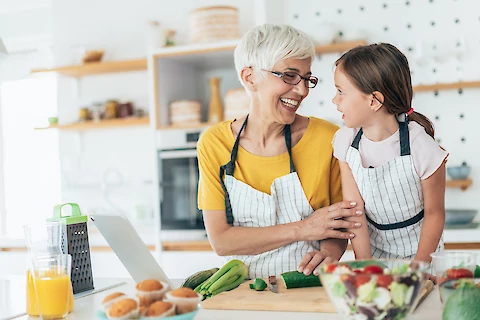
When caring for elderly relatives at home, it is essential to put food safety first. Following proper food safety practices not only protects elderly individuals but also other family members and guests in the house. By implementing some simple best practices, everyone can stay safe and reduce potential exposure to dangerous foodborne illnesses.
Why Food Safety Is Important
Food safety measures are important for people of all ages and backgrounds, but it is especially crucial for elderly individuals. As the human body naturally ages, common protective mechanisms decline. Elderly individuals may not be able to fight off foodborne illnesses resulting from contaminated or undercooked food as effectively as younger generations, making them more vulnerable to the risks associated with improper handling of food. Contaminated food can lead to much more serious illnesses in the elderly.
Food Safety Tips When Caring for an Elderly Relative
There are several simple steps that can be taken to protect elderly individuals from foodborne illnesses and potential exposure to dangerous bacteria. Some of the most important tips include:
1. Ensuring Proper Food Storage
It is important to store food in the correct temperature zones. Refrigerate perishable items as soon as possible and mark them with an expiration date. Cooked foods should not be left out of the fridge for more than two hours, and all food must be stored separately from raw ingredients (e.g., meats).
2. Practicing Safe Food Handling
When preparing food, be sure to always wash your hands thoroughly with hot water and soap before handling any ingredients. Before and after each use, cutting boards should be washed separately with warm soapy water or disinfected for an added layer of protection. Utensils such as knives must also be kept clean at all times.
3. Avoiding Cross-contamination
Cross-contamination occurs when bacteria from one food item is transferred to another. For example, when raw meats and cooked foods are left on the same cutting board. In order to prevent this, separate boards should be used for different types of ingredients. Additionally, always use clean plates and wash knives between cutting meat and other foods.
4. Knowing and Using Proper Cooking Temperatures
When preparing food, it is important to ensure that food reaches the right temperature in order to kill dangerous bacteria. This means cooking ingredients thoroughly and using a thermometer when necessary (e.g., for meat or fish). In general, items should be cooked until they reach an internal temperature of 75°C or above.
5. Washing Hands Often
Hand-washing is another essential part of food safety and must be done frequently throughout the preparation process. Hands should always be washed for at least 20 seconds with soap and water before touching any ingredients, utensils, or surfaces.
Get Help Caring for an Elderly Loved One
As your loved one ages, they may no longer practice appropriate food safety practices, which may expose them to a higher risk of foodborne illness. An in-home caregiver can help with food preparation, storage, and more. For seniors in the Grant, Huntington, Kosciusko, Marshall, Noble, Wabash, Allen, Miami, Wells, and Whitley areas, Senior Helpers Wabash can help. Contact us today to learn about our services.